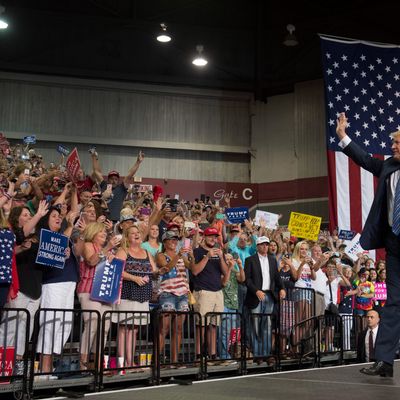
The 45th president of the United States is such a powerful font of misinformation that it’s often difficult to isolate and analyze specific things he says that are factually dubious or flat-out wrong. But this week he’s been promoting a particularly odd and potentially significant meme: that he’s a whole lot more popular than is indicated by any objective measurements.
Out of nowhere, at a West Virginia event ostensibly aimed at publicizing the effects of the GOP’s 2017 tax cut bill, Trump revived his post-2016 election claims that “millions and millions” of Californians had voted multiple times, robbing him of a national popular vote victory over Hillary Clinton. He offered no evidence for this stunning allegation, perhaps because none exists.
But Trump’s assertions of unverified popularity were not strictly retrospective. He also spent some time this week bragging about – and exaggerating – a single poll’s assessment of his current job approval numbers:
The “honest polling” bit was presumably an allusion to his past unsupported claims that most polls – i.e., the ones that don’t give him the kind of numbers he gets from Rasmussen – are “fake.” This in turn apparently depends on his belief – debunked repeatedly – that most of the polls were way off in 2016 (that’s true only if buy his massive-voter-fraud fantasy).
But in any event, his Rasmussen shout-out is as dubious as his general attitude toward polls. For one thing, while Raz’s daily tracking poll did indeed show his approval rating hitting 50 percent on Monday — and hey, 51 percent on Wednesday! — it’s back down to 47 percent on Friday. And it’s been bouncing around the mid-to-high 40s for months, also reaching 50 percent in February, and last year in April and June. Anyone even vaguely familiar with polling knows that Rasmussen’s polls have a distinctly pro-Republican “house effect.” That doesn’t mean the data it produces is useless, but does mean it strays so regularly and predictably from polling averages that a thumb on the scale is wise:
Accordingly, one of the more reliable polling average methodologies, at FiveThirtyEight, adjusts Rasmussen’s findings to counteract the “house effect.” So Friday’s 47 percent Trump approval rating goes into the averages as 42 percent. Another polling average source, RealClearPolitics, does not adjust polls for “house effects,” but similarly shows Rasmussen as being off-kilter (the current RCP average for Trump’s approval ratings is 41.5 percent). In case you want to dismiss FiveThirtyEight as a “liberal” site (despite its against-the-grain predictions in 2016 that Trump had a real chance to win), it should be noted that RCP’s management is quite conservative.
Touting Rasmussen as the only “honest” poll was not enough for Trump, though. In a radio interview today, the president suggested that his job approval number should have been higher:
“A poll just came out now, Rasmussen, it’s now 51,” Trump said. “They say that it’s 51 but add another 7 or 8 points to it. … They don’t want to talk about it, but when they get into the booth they’re going to vote for Trump.”
This belief in the “shy Trump voter,” of course, is based on an theory that had some currency early in the 2016 presidential nominating contest, but was eventually disproved, as Politico noted at the time:
[T]here’s little evidence that shy Trump voters actually exist. In the Republican primaries, he didn’t outperform his poll numbers relative to his leading challengers — and, until he ran away with the nomination in late April and May, he performed significantly worse than the polls suggested.
Perhaps Trump thinks the “shy Trump voter” phenomenon was proven true by the general election results, which showed the polls were wrong — except they really didn’t, unless you buy his voter fraud theory. You see how quickly Trump’s “reasoning” takes you down the rabbit hole to slippery contentions based on other slippery contentions.
What we cannot really know, of course, is whether the president really believes what he’s saying, or just wants other people to believe what he’s saying. But the circular nature of his disinformation can be seductive to people who are inclined in his direction anyway. If the mainstream news about him is “fake” and so are the non-Rasmussen polls, then there’s only one source of information you can trust: the man himself. Evil as it is, it’s as good a method as any to keep his troops feeling upbeat and ready to vote.






























